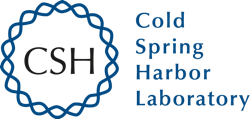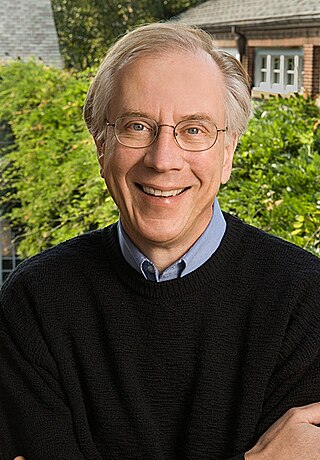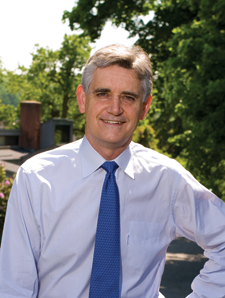Related Research Articles

James Dewey Watson is an American molecular biologist, geneticist, and zoologist. In 1953, he co-authored with Francis Crick the academic paper proposing the double helix structure of the DNA molecule. Watson, Crick and Maurice Wilkins were awarded the 1962 Nobel Prize in Physiology or Medicine "for their discoveries concerning the molecular structure of nucleic acids and its significance for information transfer in living material".

Cold Spring Harbor Laboratory (CSHL) is a private, non-profit institution with research programs focusing on cancer, neuroscience, plant biology, genomics, and quantitative biology. It is located in Laurel Hollow on Long Island, New York.

Thomas Robert Cech is an American chemist who shared the 1989 Nobel Prize in Chemistry with Sidney Altman, for their discovery of the catalytic properties of RNA. Cech discovered that RNA could itself cut strands of RNA, suggesting that life might have started as RNA. He found that RNA can not only transmit instructions, but also that it can speed up the necessary reactions.

Robert G. Roeder is an American biochemist. He is known as a pioneer scientist in eukaryotic transcription. He discovered three distinct nuclear RNA polymerases in 1969 and characterized many proteins involved in the regulation of transcription, including basic transcription factors and the first mammalian gene-specific activator over five decades of research. He is the recipient of the Gairdner Foundation International Award in 2000, the Albert Lasker Award for Basic Medical Research in 2003, and the Kyoto Prize in 2021. He currently serves as Arnold and Mabel Beckman Professor and Head of the Laboratory of Biochemical and Molecular Biology at The Rockefeller University.

Joan Elaine Argetsinger Steitz is Sterling Professor of Molecular Biophysics and Biochemistry at Yale University and Investigator at the Howard Hughes Medical Institute. She is known for her discoveries involving RNA, including ground-breaking insights into how ribosomes interact with messenger RNA by complementary base pairing and that introns are spliced by small nuclear ribonucleic proteins (snRNPs), which occur in eukaryotes. In September 2018, Steitz won the Lasker-Koshland Award for Special Achievement in Medical Science. The Lasker award is often referred to as the 'American Nobel' because 87 of the former recipients have gone on to win Nobel prizes.
Cold Spring Harbor Laboratory Press was founded in 1933 to aid in Cold Spring Harbor Laboratory's purpose of furthering the advance and spread of scientific knowledge.

The American Society for Biochemistry and Molecular Biology (ASBMB) is a learned society that was founded on December 26, 1906, at a meeting organized by John Jacob Abel. The roots of the society were in the American Physiological Society, which had been formed some 20 years earlier. ASBMB is the US member of the International Union of Biochemistry and Molecular Biology.

Bruce William Stillman is a biochemist and cancer researcher who has served as the Director of Cold Spring Harbor Laboratory (CSHL) since 1994 and President since 2003. He also served as the Director of its NCI-designated Cancer Center for 25 years from 1992 to 2016. During his leadership, CSHL has been ranked as the No. 1 institution in molecular biology and genetics research by Thomson Reuters. Stillman's research focuses on how chromosomes are duplicated in human cells and in yeast Saccharomyces cerevisiae; the mechanisms that ensure accurate inheritance of genetic material from one generation to the next; and how missteps in this process lead to cancer. For his accomplishments, Stillman has received numerous awards, including the Alfred P. Sloan, Jr. Prize in 2004 and the 2010 Louisa Gross Horwitz Prize, both of which he shared with Thomas J. Kelly of Memorial Sloan-Kettering Cancer Center, as well as the 2019 Canada Gairdner International Award for biomedical research, which he shared with John Diffley.
Ronald R. Breaker is an American biochemist who is a Sterling Professor of Molecular, Cellular, and Developmental Biology at Yale University. He is best known for the discovery of riboswitches. His current research is focused on understanding advanced functions of nucleic acids, including the discovery and analysis of riboswitches and ribozymes.

David L. Spector is a cell and molecular biologist best recognized for his research on gene expression and nuclear dynamics. He is currently a Professor at Cold Spring Harbor Laboratory (CSHL). From 2007 to 2023, he served as Director of Research of CSHL.
Robert Anthony Martienssen is a British plant biologist, Howard Hughes Medical Institute–Gordon and Betty Moore Foundation investigator, and professor at Cold Spring Harbor Laboratory, US.

Scott William Lowe is Chair of the Cancer Biology and Genetics Program in the Sloan Kettering Institute at Memorial Sloan Kettering Cancer Center. He is recognized for his research on the tumor suppressor gene, p53, which is mutated in nearly half of cancers.
Nikola Panayot Pavletich is the former chair of structural biology at Memorial Sloan Kettering Cancer Center.
Brenda L. Bass is a Distinguished Professor of Biochemistry at the University of Utah who holds the H.A. and Edna Benning Endowed Chair. She is also an adjunct professor of human genetics and an investigator at the Huntsman Cancer Institute. Her research focuses on RNA silencing and the cellular dynamics of double-stranded RNA. She was elected to the National Academy of Sciences in 2015.
Catherine (Cathy) Drennan is an American biochemist and crystallographer. She is the John and Dorothy Wilson Professor of Biochemistry professor at the Massachusetts Institute of Technology and a professor at the Howard Hughes Medical Institute.
Gregory James Hannon is a professor of molecular cancer biology and director of the Cancer Research UK Cambridge Institute at the University of Cambridge. He is a Fellow of Trinity College, Cambridge while also serving as a director of cancer genomics at the New York Genome Center and an adjunct professor at Cold Spring Harbor Laboratory.

Adrian Robert Krainer is a Uruguayan-American biochemist and molecular geneticist known for his research into RNA gene-splicing. He helped create a drug for patients with spinal muscular atrophy. Krainer holds the St. Giles Foundation Professorship at Cold Spring Harbor Laboratory in Laurel Hollow, New York.
Kim Orth is a microbiologist and biochemist. She is the Earl A. Forsythe chair in biomedical science and professor of molecular biology and biochemistry at UT Southwestern. She is a Howard Hughes Medical Institute investigator and a member of the National Academy of Sciences. Her research focuses on bacterial pathogenesis.

Luciano Marraffini is an Argentinian-American microbiologist. He is currently professor and head of the laboratory of bacteriology at The Rockefeller University. He is recognized for his work on CRISPR-Cas systems, being one of the first scientists to elucidate how these systems work at the molecular level.

Geeta J. Narlikar is an Indian–American biochemist who is Professor and the Lewis and Ruth Cozen Chair at the University of California, San Francisco. Her research considers epigenetic regulation and genome organisation. She was elected a Member of the National Academy of Sciences in 2021.
References
- ↑ "Members of the American Academy of Arts & Sciences: 1780–2017" (PDF). amacad.org. Retrieved 2024-07-24.
- ↑ "CSHL's Dr. Leemor Joshua-Tor is elected to The National Academy of Sciences". Cold Spring Harbor Laboratory. 2 May 2017. Retrieved 26 April 2019.
- 1 2 3 4 5 "Research profile: Leemor Joshua-Tor". Cold Spring Harbor Laboratory. 27 November 2017. Retrieved 26 April 2019.
- ↑ "Leemor Joshua-Tor". HHMI.org. Retrieved 26 April 2019.
- 1 2 "Joshua–Tor recognized as 'one of the top scientists in her field'". www.asbmb.org.
- ↑ "SBGrid Consortium - Member Tale - Leemor Joshua-Tor - Cold Spring Harbor Laboratory". sbgrid.org. Retrieved 26 April 2019.
- 1 2 "Leemor Joshua-Tor". HHMI.org. Retrieved 2020-04-29.
- ↑ "Joshua-Tor, Leemor". www.beckman-foundation.org. Retrieved 26 April 2019.
- ↑ "Leemor Joshua-Tor". www.nasonline.org. Retrieved 26 April 2019.
- ↑ "The Harvey Society: Lecture Series 114 (2018—2019)".